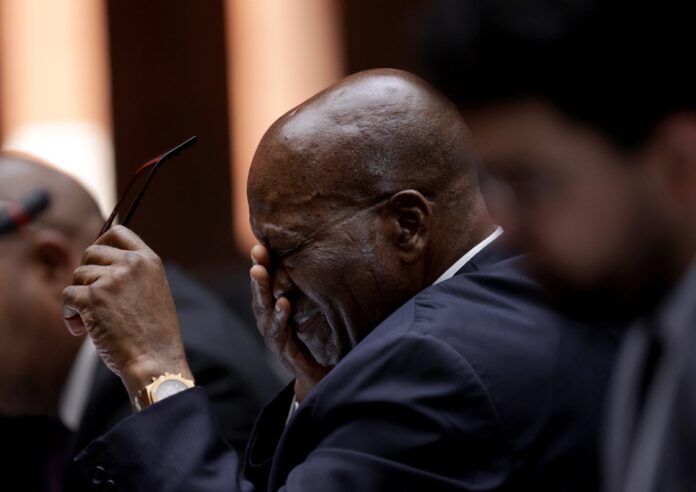The ANC's recent national executive committee meeting in Boksburg brought intense disputes and a tense mood as party leaders grappled with election aftermath.
One dramatic ending saw ANC heavyweight Nkenke Kekana intensely questioned by Gauteng leaders over claims that he spread false reports of a plot by the province to pardon Jacob Zuma.
Sunday World reported that Gauteng ANC chair Panyaza Lesufi and secretary TK Nciza confronted Kekana on a call after learning that he allegedly spread the word. The edged meeting involved Lesufi, Nciza, Kekana and Gauteng ANC speaker Lesego Makhubela.
While efforts to get comments from those involved came up empty, sources confirmed the heated dialogue did occur.
According to the alleged disinformation, Lesufi had planned to propose a motion in the NEC that if Zuma could be pardoned for his contempt of court judgment then the MK Party would be amenable to supporting the ANC in the upcoming elections. However, Lesufi’s allies said he was convinced otherwise by his comrades.
"Lesufi particularly took exception to a planted narrative that he was pro-MK Party because of a non-existent so-called deal to plead Zuma’s case. The fabricated narrative was so far-fetched because the NEC didn’t have powers to pardon any ex-convict, as that responsibility solely rested with the president," a source revealed.
Supporters of the Gauteng ANC leadership deemed the alleged disinformation campaign part of a vast conspiracy to dismantle the provincial executive committee, exploiting the pretext that they were Zuma loyalists within the governing party. They too alleged that the disinformation aspired to further strain the already strained relationship between the Gauteng ANC and Luthuli House following the province's decision to spurn the DA in the provincial government of unity, a move that has been criticized as contradicting President Cyril Ramaphosa's national-level agreement with the blue party.
The contention between the two factions came to the fore during a recent Sunday World Engage interview, where ANC secretary-general Fikile Mbalula confronted Lesufi for addressing a media conference while wearing an T-shirt emblazoned with the words "Don't Kill Chris Hani Again". Lesufi donned the T-shirt early last month while sharing the stage with Mbalula at Luthuli House during the breakdown of the provincial government of unity negotiations with the DA.
Just last week, Mbalula issued a stern warning to ANCYL president Collen Malatji, seen as his ally, and Gauteng elections head Lebogang Maile, to cease their misbehaviour or face disciplinary action for bringing the ANC into disrepute. The duo had a public spat on social media as part of the ongoing cold war between Luthuli House and provincial leaders. Also last week, ANC Veterans League president Snuki Zikalala confirmed to Sunday World that there was a push to dismantle the Gauteng ANC, but denied being part of the lobbying effort.
Meanwhile, respected ANC intellectual Joel Netshitenzhe was apparently reprimanded at the meeting after he blame the party's problems on the 2008 ANCYL generation that was led by Julius Malema.
According to NEC insiders, , Netshitenzhe blamed the "militancy and flamboyance" of that generation for the ANC's current struggles during his presentation. However, his submission faced fierce resistance particularly from members of that generation who hold significant representation in the current NEC.
“We pinned him against the wall because what he was saying was totally revisionist; how can you blame the problems of the ANC on a generation that was dealt with the harshest by their elders? It is not the 2008 generation that expelled Julius Malema, who now leads the EFF, which is among the factors contributing to the ANC’S dipping electoral support. It is them, the elders, so we were not going to sit there and listen to misguided scapegoating” one NEC member said.
Another NEC leader said there is need to challenge Netshitenzhe’s belief that the 2008 ANCYL generation brought inappropriate flamboyance to politics.
“That was sadly a subjective opinion that was devoid of historical context and facts. Even if we were to accept his version, which we rejected, how does he blame that generation, which was in fact not working alone? It was not that generation that gave birth to MK and the EFF; those are the two elephants in the room, but we must locate them correctly within a complete history,” said the NEC leader.
Since last week, the NEC has engaged in introspective examination of the electoral results, illuminating uncertainties about Zuma's "MK Party members disguised as ANC members." The ANC leadership also highlighted the MK Party's "improper usage of ethnic recruiting."
Beyond the effects of the MK Party, deficiencies were shown in the strategies employed by the Kwazulu-Natal provincial executive committee, instigating the NEC to advocate for a more tactical approach to dealing with the various constituencies within the province. Furthermore, certain members expressed that organizational weaknesses were evident at the local level, failing to adequately address community needs during the election period. However, others argued that broader macroeconomic factors may have also influenced voting decisions to some degree.
“There are weaknesses in the ANC provincial executive committee in Kwazulu-natal, for being reckless in handling different constituencies,” said an NEC member.
While ANC officials lamented the public health crisis and economic hardships complicating campaign efforts, opposition supporters celebrated significant gains. The ruling party faced strong headwinds campaigning amidst the pandemic's rising case numbers, national unemployment figures exceeding 30%, and the recurring power blackouts burdening families and businesses. Defeat at the polls demands deep reflection on how to reconnect with frustrated citizens struggling in a time of hardship, according to ANC leaders acknowledging the stinging rebuke delivered by voters. A thorough review of not only the results but the root causes driving shifting public sentiment is required to chart a path towards regaining lost support and securing an electoral mandate to lead the country beyond this challenging season.
“We undertook these elections on the backdrop of Covid-19, deepening unemployment and loadshedding,” said a person who attended the meeting, speaking following a presentation by ANC head of elections Mdumiseni Ntuli on Friday.
According to party insiders, voter turnout was one of the major issues identified and interestingly the majority of registered voters did not vote.
Local issues also influenced voting patterns at the local government level and the ANC now understands that the party must address local dynamics and concerns more effectively in order to regain voter trust.











